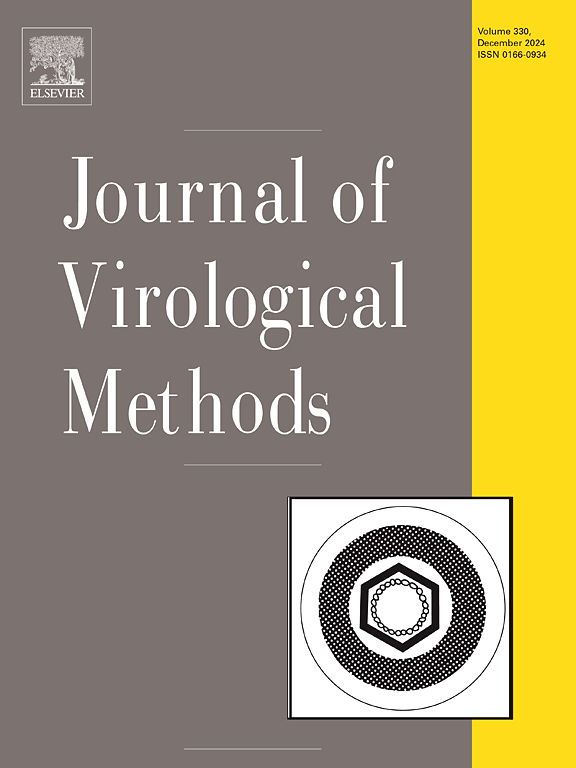Development of an ORF154-DIVA ELISA for serological differentiation of LSDV-infected and vaccinated animals
IF 1.6
4区 医学
Q3 BIOCHEMICAL RESEARCH METHODS
引用次数: 0
Abstract
Mass vaccination to achieve disease-free status requires a serological test to differentiate infected and vaccinated animals (DIVA) towards the end of the control program. The lumpy skin disease (LSD) vaccines currently in use (licensed) are not DIVA-compatible. India recently approved a new live-attenuated LSD vaccine derived from the local LSD virus (LSDV) strain (Ranchi). Unlike field LSDV strains, the Ranchi strain has a distinct 801-nucleotide deletion in its inverted terminal repeat (ITR) region, affecting ORF003/ORF154. In this study, we successfully cloned and expressed LSDV ORF154 into pET28a and purified the His-tagged protein using Ni-NTA affinity chromatography. SDS-PAGE and Western blot analyses confirmed the presence of a ∼28 kDa protein, consistent with the predicted molecular weight. An optimized antigen concentration of 500 ng/well and serum dilution of 1:50, and at a positivity cut-off of 22.63 %, the assay showed high sensitivity (95.77 %) and specificity (95.42 %), effectively distinguishing infected from vaccinated cattle. These findings demonstrate the potential of an ORF154-based ELISA as a reliable serological diagnostic tool for LSDV surveillance and disease control programs, making the Ranchi strain-based LSDV vaccine the first DIVA-compatible vaccine.
区分lsd感染和接种动物的ORF154-DIVA ELISA试剂盒的建立
为实现无病状态进行大规模疫苗接种,需要在控制规划结束时进行血清学检测,以区分感染动物和接种动物(DIVA)。目前使用的(已获得许可的)肿块性皮肤病(LSD)疫苗与diva不兼容。印度最近批准了一种从当地兰契毒株提取的新型LSD减毒活疫苗。与LSD病毒(LSDV)的野毒株不同,Ranchi毒株在其反向末端重复序列(ITR)区域有明显的801核苷酸缺失,影响ORF003/ORF154。在本研究中,我们成功地将LSDV ORF154克隆并表达到pET28a中,并使用Ni-NTA亲和层析纯化了his标记的蛋白。SDS-PAGE和Western blot分析证实了~28kDa蛋白的存在,与预测的分子量一致。优化后的抗原浓度为500ng/孔,血清稀释度为1:50,阳性截止值为22.63%,具有较高的灵敏度(95.77%)和特异性(95.42%),可有效区分感染牛和接种牛。这些发现证明了基于orf154的ELISA作为LSDV监测和疾病控制计划的可靠血清学诊断工具的潜力,使基于Ranchi株的LSD疫苗成为首个与diva兼容的疫苗。
本文章由计算机程序翻译,如有差异,请以英文原文为准。
求助全文
约1分钟内获得全文
求助全文
来源期刊
CiteScore
5.80
自引率
0.00%
发文量
209
审稿时长
41 days
期刊介绍:
The Journal of Virological Methods focuses on original, high quality research papers that describe novel and comprehensively tested methods which enhance human, animal, plant, bacterial or environmental virology and prions research and discovery.
The methods may include, but not limited to, the study of:
Viral components and morphology-
Virus isolation, propagation and development of viral vectors-
Viral pathogenesis, oncogenesis, vaccines and antivirals-
Virus replication, host-pathogen interactions and responses-
Virus transmission, prevention, control and treatment-
Viral metagenomics and virome-
Virus ecology, adaption and evolution-
Applied virology such as nanotechnology-
Viral diagnosis with novelty and comprehensive evaluation.
We seek articles, systematic reviews, meta-analyses and laboratory protocols that include comprehensive technical details with statistical confirmations that provide validations against current best practice, international standards or quality assurance programs and which advance knowledge in virology leading to improved medical, veterinary or agricultural practices and management.

 求助内容:
求助内容: 应助结果提醒方式:
应助结果提醒方式:


